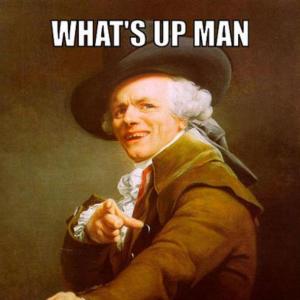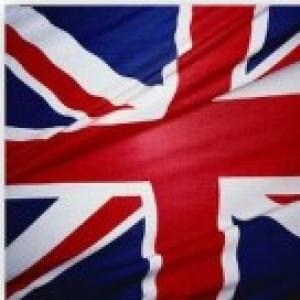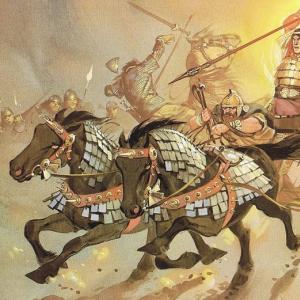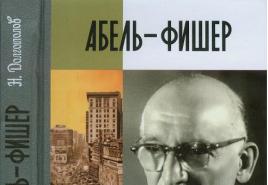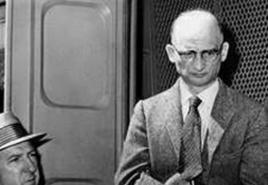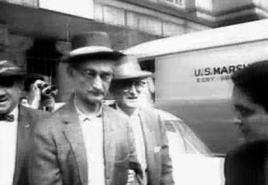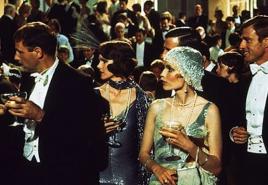Presentation "old Russian alphabet". The first primer presentation for the reading lesson (grade 1) on the topic Literacy lesson old alphabets and primers
Slide 2
"Primer" and "ABC" are the first books of a student.
Listen to a small excerpt from the ancient Russian book "The Tale of Bygone Years": "It is great to crawl from the teachings of the book ... Aschebopischeshivknigakh wisdom is correct, then it is common for my soul to crawl ..." - Did you understand what I read about? In modern language, this saying would sound like this: There is great benefit from book teaching ... If you look for wisdom in books, you will find great benefit to your soul. What does this passage teach?
Slide 3
The primer is the first educational book that falls into the hands of a child. The mastery of literacy begins with her. Children learn to read and write using it. Today I will tell you about how the ABC books were created, by which all the children of our country study.
Slide 4
In ancient times, children also went to school, but they did not read the ABC book and they did not write in notebooks. In the old days, letters were carved on wooden boards, and they wrote in notebooks made of birch bark. Then books appeared on the ground. At first, book sheets were made from animal skin, and later they began to be made from paper.
Slide 5
Already in ancient times, people understood how important it is to be able to read books, because reading books, you learn a lot of important and interesting things. At first, the books were handwritten. They were copied by hand. It took a long time to rewrite the books, which made the books very expensive and few. Over time, humans invented machines that could print any number of books. And so the first printed alphabet appeared on earth - the alphabet of Ivan Fedorov. The letters of this alphabet were a bit like ours. But can you read what is written here?
Slide 6
Slide 7
What are the first letters of the modern alphabet (A, B, C, D, D ...). And before these letters were written and called quite differently. For example: a - az, b - beeches, c - lead, d - verb, d - good, f - there is, w - life, and - like, l - people, c - word, etc. What word comes from the name of the first Russian letters? (ABC).
Slide 8
Learning to read in those days took 2-3 years. First, the teacher forced the children to memorize the names of letters, then add syllables from them, then words. For example, beeches + people + az \u003d blah, verb + he \u003d go, \u003d blah, word + people + he \u003d layer, \u003d blah-ho-word, lead + ilk \u003d vi, \u003d blah-ho-word ... It was not by chance that I chose such an incomprehensible word. Indeed, in those days there were no special stories for children. And the children learned to read the texts of prayers that were completely incomprehensible to them. Can you imagine how difficult it was then to learn to read?
Slide 9
Gradually, the texts of prayers incomprehensible to children began to disappear from the primers, and instead of them, texts of various instructions and teachings appeared. For example, on the pages of "The Magnificent Russian Alphabet. A Gift for Good Children" one could read the following texts: Don't talk a lot, and get used to listening more; be meek, quiet, modest. Not everything that comes to mind, tell; but always think about what you intend to talk about. What you really do not know, do not argue or dispute. What you borrowed, give it back; what you promised, fulfill that you received freely, for that give thanks. Honor your parents. teachers and your elders, obey the orders of the former and listen to the advice of the latter. when elders speak, listen carefully and do not interrupt their speech. Don't put off until tomorrow what you can do today.
Slide 10
In those distant times, various primers were printed: some for children from wealthy families - colored, with beautiful, elegant pictures, others for poor peasant and working children. For the common people, they made small, poorly printed, books without illustrations. But there were also good kind people in our country who took care of children. For example, Lev Nikolaevich Tolstoy in his estate Yasnaya Polyana, with his own money, organized a school for poor peasant children. Especially for this school, he created the "ABC". In it, he included small stories about the life of peasants. Many stories from the ABC of Leo Nikolaevich Tolstoy are still used to teach children to read.
Slide 11
Slide 12
Slide 13
Slide 14
Slide 15
Another great Russian teacher Konstantin Dmitrievich Ushinsky created a textbook for children "Rodnoe Slovo". This textbook went through 147 editions. It consisted of two books: "ABC" and "The first book after the ABC". In "ABC" Ushinsky places drawings to depict them on the cells to prepare the child for writing with the help of interesting drawings. Then he gives prescriptions, written and printed alphabets. First, the children had to select sounds in the simplest words (ay, ya, wasp), learned to write letters denoting them, then read what was written.
Slide 16
The primers were constantly being improved. Your great-grandmothers and great-grandfathers learned from the primer of Dmitry and Elena Tikhomirov. This primer is very similar to modern primer books. It has been published over 160 times. And now in some schools they study with the Tikhomirovs' primer.
Slide 17
Slide 18
Slide 19
Slide 20
When your mums and dads went to school, a new colorful primer was created. This primer has remained virtually unchanged for 40 years. According to the content, the material of the primer is divided into three parts: preparatory, primer and post-primer periods. During the preparatory period, children learned to distinguish between sentences, words and syllables. For this, various paintings, series of drawings, subject pictures were used. During the alphabetical period, the main task was to learn to distinguish between sounds and letters, to read words and small texts. In the post-primer period, pupils read interesting and entertaining stories and poems.
Slide 1
Popova Elena Mikhailovna, primary school teacher "MOU Sukhovskaya secondary school No. 3" FIRST LETTER, made a presentation for a literacy lesson in grade 1Slide 2
 "Primer" and "ABC" are the first books of a student. Listen to a small excerpt from the old Russian book "The Tale of Bygone Years": "It is great to be crawling away from the teachings of the book ... If you look for wisdom in the books, you will find a great crawl of your soul ..." - Did you understand what I read about ? In modern language, this saying would sound like this: There is great benefit from book teaching ... If you look for wisdom in books, you will find great benefit to your soul. What does this passage teach?
"Primer" and "ABC" are the first books of a student. Listen to a small excerpt from the old Russian book "The Tale of Bygone Years": "It is great to be crawling away from the teachings of the book ... If you look for wisdom in the books, you will find a great crawl of your soul ..." - Did you understand what I read about ? In modern language, this saying would sound like this: There is great benefit from book teaching ... If you look for wisdom in books, you will find great benefit to your soul. What does this passage teach?
Slide 3
 The primer is the first educational book that falls into the hands of a child. The acquisition of literacy begins with her. Children learn to read and write using it. Today I will tell you about how the primers were created, by which all the children of our country study.
The primer is the first educational book that falls into the hands of a child. The acquisition of literacy begins with her. Children learn to read and write using it. Today I will tell you about how the primers were created, by which all the children of our country study.
Slide 4
 In ancient times, children also went to school, but they did not read the ABC book and they did not write in notebooks. In the old days, letters were carved on wooden boards, and they wrote in notebooks made of birch bark. Then books appeared on the ground. At first, book sheets were made from animal skin, and later they began to be made from paper.
In ancient times, children also went to school, but they did not read the ABC book and they did not write in notebooks. In the old days, letters were carved on wooden boards, and they wrote in notebooks made of birch bark. Then books appeared on the ground. At first, book sheets were made from animal skin, and later they began to be made from paper.
Slide 5
 Already in ancient times, people understood how important it is to be able to read books, because reading books, you learn a lot of important and interesting things. At first, the books were handwritten. They were copied by hand. It took a long time to rewrite the books, which made the books very expensive and few. Over time, humans invented machines that could print any number of books. And so the first printed alphabet appeared on earth - the alphabet of Ivan Fedorov. The letters of this alphabet were a bit like ours. But can you read what is written here?
Already in ancient times, people understood how important it is to be able to read books, because reading books, you learn a lot of important and interesting things. At first, the books were handwritten. They were copied by hand. It took a long time to rewrite the books, which made the books very expensive and few. Over time, humans invented machines that could print any number of books. And so the first printed alphabet appeared on earth - the alphabet of Ivan Fedorov. The letters of this alphabet were a bit like ours. But can you read what is written here?
Slide 6

Slide 7
 What are the first letters of the modern alphabet (A, B, C, D, D ...). And before these letters were written and called quite differently. For example: a - az, b - beeches, c - lead, d - verb, d - good, f - there is, w - life, and - like, l - people, c - word, etc. What word comes from the name of the first Russian letters? (ABC).
What are the first letters of the modern alphabet (A, B, C, D, D ...). And before these letters were written and called quite differently. For example: a - az, b - beeches, c - lead, d - verb, d - good, f - there is, w - life, and - like, l - people, c - word, etc. What word comes from the name of the first Russian letters? (ABC).
Slide 8
 Learning to read in those days took 2-3 years. First, the teacher forced the children to memorize the names of letters, then add syllables from them, then words. For example, beeches + people + az \u003d blah, verb + he \u003d go, \u003d blah, word + people + he \u003d layer, \u003d blah-ho-word, lead + ilk \u003d vi, \u003d blah-ho-word ... It was not by chance that I chose such an incomprehensible word. Indeed, in those days there were no special stories for children. And the children learned to read the texts of prayers that were completely incomprehensible to them. Can you imagine how difficult it was then to learn to read?
Learning to read in those days took 2-3 years. First, the teacher forced the children to memorize the names of letters, then add syllables from them, then words. For example, beeches + people + az \u003d blah, verb + he \u003d go, \u003d blah, word + people + he \u003d layer, \u003d blah-ho-word, lead + ilk \u003d vi, \u003d blah-ho-word ... It was not by chance that I chose such an incomprehensible word. Indeed, in those days there were no special stories for children. And the children learned to read the texts of prayers that were completely incomprehensible to them. Can you imagine how difficult it was then to learn to read?
Slide 9
 Gradually, the texts of prayers incomprehensible to children began to disappear from the primers, and instead of them, texts of various instructions and teachings appeared. For example, on the pages of "The Magnificent Russian Alphabet. A Gift for Good Children" one could read the following texts: Don't talk a lot, and get used to listening more; be meek, quiet, modest. Not everything that comes to mind, tell; but always think about what you intend to talk about. What you really do not know, do not argue or dispute. What you borrowed, give it back; what you promised, fulfill that you received freely, for that give thanks. Honor your parents. teachers and your elders, obey the orders of the former and listen to the advice of the latter. when elders speak, listen carefully and do not interrupt their speech. Don't put off until tomorrow what you can do today.
Gradually, the texts of prayers incomprehensible to children began to disappear from the primers, and instead of them, texts of various instructions and teachings appeared. For example, on the pages of "The Magnificent Russian Alphabet. A Gift for Good Children" one could read the following texts: Don't talk a lot, and get used to listening more; be meek, quiet, modest. Not everything that comes to mind, tell; but always think about what you intend to talk about. What you really do not know, do not argue or dispute. What you borrowed, give it back; what you promised, fulfill that you received freely, for that give thanks. Honor your parents. teachers and your elders, obey the orders of the former and listen to the advice of the latter. when elders speak, listen carefully and do not interrupt their speech. Don't put off until tomorrow what you can do today.
Slide 10
 In those distant times, various primers were printed: some for children from wealthy families - colored, with beautiful, elegant pictures, others for poor peasant and working children. For the common people, they made small, poorly printed, books without illustrations. But there were also good kind people in our country who took care of children. For example, Lev Nikolaevich Tolstoy in his estate Yasnaya Polyana, with his own money, organized a school for poor peasant children. Especially for this school, he created the "ABC". In it, he included small stories about the life of peasants. Many stories from the ABC of Leo Nikolaevich Tolstoy are still used to teach children to read.
In those distant times, various primers were printed: some for children from wealthy families - colored, with beautiful, elegant pictures, others for poor peasant and working children. For the common people, they made small, poorly printed, books without illustrations. But there were also good kind people in our country who took care of children. For example, Lev Nikolaevich Tolstoy in his estate Yasnaya Polyana, with his own money, organized a school for poor peasant children. Especially for this school, he created the "ABC". In it, he included small stories about the life of peasants. Many stories from the ABC of Leo Nikolaevich Tolstoy are still used to teach children to read.
Slide 11

Slide 12

Slide 13

Slide 14

Slide 15
 Another great Russian teacher Konstantin Dmitrievich Ushinsky created a textbook for children "Rodnoe Slovo". This textbook went through 147 editions. It consisted of two books: "ABC" and "The first book after the ABC". In "ABC" Ushinsky places drawings to depict them on the cells to prepare the child for writing with the help of interesting drawings. Then he gives prescriptions, written and printed alphabets. First, the children had to select sounds in the simplest words (ay, ya, wasp), learned to write letters denoting them, then read what was written.
Another great Russian teacher Konstantin Dmitrievich Ushinsky created a textbook for children "Rodnoe Slovo". This textbook went through 147 editions. It consisted of two books: "ABC" and "The first book after the ABC". In "ABC" Ushinsky places drawings to depict them on the cells to prepare the child for writing with the help of interesting drawings. Then he gives prescriptions, written and printed alphabets. First, the children had to select sounds in the simplest words (ay, ya, wasp), learned to write letters denoting them, then read what was written.
Slide 16
 The primers were constantly being improved. Your great-grandmothers and great-grandfathers learned from the primer of Dmitry and Elena Tikhomirov. This primer is very similar to modern primer books. It has been published over 160 times. And now in some schools they study with the Tikhomirovs' primer.
The primers were constantly being improved. Your great-grandmothers and great-grandfathers learned from the primer of Dmitry and Elena Tikhomirov. This primer is very similar to modern primer books. It has been published over 160 times. And now in some schools they study with the Tikhomirovs' primer.
Slide 17

Slide 18

Slide 19

Slide 20
 When your mums and dads went to school, a new colorful primer was created. This primer has remained virtually unchanged for 40 years. According to the content, the material of the primer is divided into three parts: preparatory, primer and post-primer periods. During the preparatory period, children learned to distinguish between sentences, words and syllables. For this, various paintings, series of drawings, subject pictures were used. During the alphabetical period, the main task was to learn to distinguish between sounds and letters, to read words and small texts. In the post-primer period, pupils read interesting and entertaining stories and poems.
When your mums and dads went to school, a new colorful primer was created. This primer has remained virtually unchanged for 40 years. According to the content, the material of the primer is divided into three parts: preparatory, primer and post-primer periods. During the preparatory period, children learned to distinguish between sentences, words and syllables. For this, various paintings, series of drawings, subject pictures were used. During the alphabetical period, the main task was to learn to distinguish between sounds and letters, to read words and small texts. In the post-primer period, pupils read interesting and entertaining stories and poems.
Sections: elementary School
Objectives:
- to give an idea of \u200b\u200bthe primer and the Cyrillic alphabet;
- to promote spiritual and moral education;
- develop creative thinking.
Equipment:
- modern Russian alphabet,
- aBCs and primers of different years of publication,
- photograph of the monument to Cyril and Methodius in Moscow by A.P. Konanykhin,
- illustrations of the textbook on the topic,
- phonorecording "Epic Tune" N. Rimsky-Korsakov.
Note:
- School of Russia program,
- textbook "Russian alphabet" by V.G. Goretsky.
During the classes
I. Org. moment. Statement of the topic.
(On the blackboard is an exhibition of books - ABCs and primers)
Guys, today we will plunge into history and learn a lot of new and interesting things.
Have you ever heard of people like Cyril and Methodius? (Picture 1)
What do you know about them?
(Cyril and Methodius were brothers. And to communicate at a distance, they created the Slavic alphabet, that is, the Slavic alphabet).
Why do you think Cyril and Methodius called their alphabet Slavic?
(Because there used to be a Slavic people).
So, we will talk about Cyril and Methodius, we will find out what they did for the people.
II. Work on the topic of the lesson.
Now let's look at our textbook, you can see that it has the name "Russian alphabet". Why do you think the alphabet was named Russian?
("Russian alphabet" was created in our time, ie by the Russian people)
Do you know who created your textbook?
To find out, we need to open the 4th page, and there we can read the authors of the textbook. (V.G. Goretsky, L.F. Klimanova).
So, in order for us to learn in more detail everything about Cyril and Methodius, about their Slovenian alphabet, you must open the textbook on page 214.
I am now going to read to you the text "The Slavonic Primary Teachers", and you listen carefully, then tell me what you learned from this text.
(The teacher reads the text from the textbook, at this time the music "Epic tune" by N. Rimsky-Korsakov sounds).
The text contains such a word as EQUAL APOSTAL
(The word is put on the board)
Do you know who the Equal Apostles were called?
Equal to the apostles are people who are equal before the apostle.
The APOSTLE is a disciple of Jesus Christ, bringing his teaching to people (the definition is taken from the dictionary of S.I. Ozhegov).
Guys, who is Jesus Christ?
JESUS \u200b\u200bCHRIST is the son of God who came to earth in the guise of a man who created the earth and heaven.
(Reading the text by the teacher).
What new have you learned from this text?
(Cyril and Methodius were disciples of the Lord and Jesus Christ. The spelling of the letters has changed a lot, some letters have disappeared, but the basis has remained. On May 24, the holiday of Slavic writing and culture is held in Russia).
Now read this text in a whisper and try to find sentences that can be attributed to this illustration. (Figure 2)
III. Physical education (visual gymnastics).
IV. Continuation of work on the topic.
Tell me, who wrote the first educational book?
To find out, we need to open the tutorial on page 216.
Now I am going to read you the text "First Primer", and you listen to it carefully.
This text contains words you don't know:
- PRINTER
- PRAYER
(Words are put on the board).
Who is the pioneer printer?
(This is the man who first introduced typography.)
What is prayer?
(This is a specific text that believers read when addressing God and the saints).
(Reading by the teacher of the text "First Primer").
What new have you learned from this text? Who wrote? When did you write?
How did the first primer end?
(Prayers and teachings).
Now I'll read the lesson again, and you tell me, what does it teach?
(This lesson teaches that "children obey their parents and then they will live long on earth").
Guys, do you think our alphabet differs from the old, from the ancient alphabet?
Of course, the alphabet has changed over the years. For example, Lev Nikolaevich Tolstoy created his own alphabet, which consisted of 35 letters. If you look at them, you can see that some of the letters are different from our modern letters.
(On the board is an exhibition of books of different years of publication).
Let's take a look at the board. There are books here. They range in age from the oldest books to our modern textbook. As you can see these are ABCs and ABCs.
(The teacher demonstrates books to students, leafs through, shows illustrations).
What information do they contain?
How are the ABC and ABC book similar?
(They are similar in content).
That's right, they are similar in content, i.e. serve to study letters.
V. Physical education.
How many knows the modern alphabet?
Let's play with you this game: now I will show letters - if I show a letter for a vowel sound, you clap your hands, if a consonant sound, jump.
Vi. Continuation of work on the topic.
(Music sounds).
A long time ago, Cyril and Methodius wrote on rolls of paper, and now we need to read these rolls, but they are written in Slavic letters, we need to correlate them with our Russian letters. To do this, we need to split into six groups.
Vii. Working in groups.
(Children work on the instructions of the teacher: they correlate the letters of the Slavic alphabet with the modern one. The teacher posts their answers on the blackboard.) (Figure 3-8).
VIII. Summing up the lesson.
Let's remember what we studied in today's lesson.
(Words are written on the board)
Ivan Fedorov
What have you learned about him?
Cyril and Methodius
What new have you learned about them?
What does this number tell you?
Now let's play a little.
IX. Physical education.
The game is called "Japanese car". You probably all know that Japanese things are very good and comfortable, but if things break, then they cannot be fixed. So, to play this game you need to know the movements and the alphabet. In order not to get confused in the alphabet, you have leaflets on your tables with the correct pronunciation of letters (Attachment 1) ... And the movements are like this (clap your hands, clap your knees, snap your fingers). Repeat after me. The car will start when everyone performs these movements correctly. Now for each clap of our hands, we will name letters in turn, in alphabetical order. I start.
X. Reflection
Our lesson is over. What did he teach you? How many of you wanted to know more about our alphabet? Thank you very much for your work in the lesson. You are great today!
- Prepared
- teacher of Russian language and literature
- MBOU "Gymnasium No. 9"
- g.o. Kolomna, Moscow region
- Khalyapina Larisa Nikolaevna
- According to J. Kesler's hypothesis, the Old Slavic alphabet (in which there are 29 letters) contains 7, which are verbs. Also in the alphabet there are adverbs, pronouns and plural nouns.
- In general, the alphabet is a Message. The collection of coding phrases allows each sound to be given a letter. And now let's try to read the message contained in the Old Slavic alphabet:
- A verb is a "word", and not only spoken, but also written.
- Good is “property, acquired wealth”.
- Yes (natural) - 3rd l. units h. from the verb "to be".
- The verb is good naturally: the word is an asset.
- Live (instead of the second "i" the letter "yat" was previously written, you pronounced live) - imperative mood, plural from "live" - \u200b\u200b"live in labor, and not vegetate"
- Zelo (conveyed the combination dz \u003d voiced ts) - “diligently, with zeal”.
- Earth - “planet Earth and its inhabitants, earthlings”.
- And - the union "and".
- Those who are, they are.
- Kako - "how", "like". People are “intelligent beings”.
- Live green, earth, and people like that:
- live working hard, earthlings, and as befits men.
- Think (written with the letter "yat", pronounced "thought", just like "you live") - imperative mood, pl. h. from “to think, to comprehend with the mind”.
- Nash is “our” in the usual sense.
- On - "this" in the meaning of "one, one".
- Rooms (rest) - "the basis (of the universe)". Wed “To rest” - “to be based on…”.
- Think of our peace:
- comprehend our universe.
- Rtsy (rtsi) - imperative mood: “speak, utter, read aloud”. Wed "Speech".
- The word is “transmitting knowledge”.
- Firmly - “confidently, confidently”.
- Rtsy word is firm -
- carry knowledge with conviction.
- Uk is the basis of knowledge, doctrine. Wed science, teach, skill, custom.
- Fert, f (b) rt - “fertilizes”. The alphabet recorded the difference between the sounds "p" and "f", as well as their voiced counterparts "b" and "c".
- In the Middle Ages, the South Europeans who pronounced "f" instead of "p" were called fryags in Russia precisely because of the peculiarities of speech: this, for example, distinguished the southern Franks from the North Prussians, the Thracians from the Persians, etc.
- Her - “divine, given from above”. Wed German Negg (lord, God), Greek. "Hiero" (divine), English, hero (hero), as well as the Russian name of God - Khors.
- Uk fart Her: knowledge impregnates the Almighty, knowledge is a gift from God.
- Tsy (qi, tsti) - "tochi, penetrate, penetrate, dare."
- Worm (worm) - "he who sharpens, penetrates."
- Ш (т) а (Ш, Щ) - “what” means “to”.
- B, b (ep / er, br) - are variants of one letter, meaning an indefinite short vowel close to e.
- The rolling sound "r" is pronounced with the obligatory initial aspiration (initial "b") and an echo (final "b"). The word "ъръ", apparently, meant existence, eternal, innermost, space-time, inaccessible to the human mind, a torch, the Sun.
- In all likelihood, "bp" is one of the most ancient words of modern civilization, cf. Egyptian Ra - Sun, God.
- The word “time” itself contains the same root, since the initial “in” developed precisely from “b”. Many native Russian words contain this root, for example: morning - "from the Sun" (root ut - from there, there); evening (vek-ry) - "the age of Ra, the expiring time of the Sun". In the sense of “space, the Universe,” the Russian “frame” comes from the same root. The word “paradise” means: “many Suns” \u003d “the abode of the gods (God Ra)”.
- The very name of the gypsies "rum, rum" - "free (s)", "God is in me", "I am the Universe", hence the Indian Rama. In the sense of "light, luminary, source of light": the cry "hurray!" means - "to the Sun!", bright - "like sunlight", "rainbow", etc.
- In the ABC, in all likelihood, the word "bp (a)" is in the genitive case with the meaning of "I am".
- Yus (yus small) - "light, old Russian yas".
- In modern Russian, the root "yas" is preserved, for example, in the word "clear".
- Yat (yati) - “to comprehend, to have”. Wed withdraw, take, etc.
- Tsy, worm, shta ya yus yati! It stands for:
- "Dare, tochi, worm, to comprehend the light of existence!"
- The totality of the above phrases makes up the alphabetical Message: Az Buki Veda Verb Good Naturally Live Green Earth And What People Think Our He Rooms Rtsy Word Firmly Uk Furt Her Tsy Worm Shta Yus Yati.
- Option one
- I know the letters: the letter is an asset. Work hard, earthlings, as befits reasonable people - comprehend the universe! Carry the word with conviction: knowledge is a gift from God! Dare, penetrate in order to comprehend the Light of God!
- Az Buki Vedi - I know God. Az is the foundation, the beginning, I. I - my world begins with me. And now I am the last letter of the alphabet. The basis for everything is the knowledge of God and their ancestors, that is, their parents, their roots.
- The verb Good - say, do good. Remember in Pushkin: "Burn the hearts of people with a verb."
- A verb is both a word and a deed at the same time. I say - then I do. And I do good.
- Good is Life - only goodness creates life.
- You live very earth. - Live by the earth, it is our nurse.
- And how people think - it is our peace. Those. as you people think, so is your world.
- I Know God.
- I say and do good.
- Good is Life.
- Live the Earth, she is our nurse.
- And How We People Think -
- this is also Our world.
- http://img13.nnm.ru/5/9/5/9/d/5959d12e7df1705615376aec7f12ddea_full.jpg
- http://s56.radikal.ru/i151/0910/8c/3614ed3fb430.png
- http://whynotra.moy.su/_nw/34/77282799.jpg
- http://s010.radikal.ru/i312/1103/4a/22dcac1762c0.jpg
- https://yandex.ru/images/search?img_url
- http://www.baby.ru/blogs/post/164325851-32216313/
- Ermolaeva I.A. the village of Pavlovsk Altai Territory
"Writing in Russia" - Changes under Peter I. Old Russian manuscripts of the 9th - 14th centuries were written by the charter. With the development of speed, signs of individual handwriting appear. History of writing in Russia. The alphabet is much older than the alphabet. Writing styles changed. What is the difference between the alphabet and the alphabet? Plan. Old Russian text. Cyrillic and Glagolitic.
"Cossacks" - Living conditions, customs, how the military-physical education of the Cossacks was set. Cossacks. By 1916, the Cossacks numbered 4.5 million people, among whom were Russians, Ukrainians, Mongol-Buryats, and Tatars. In the middle of a flat valley from two weeks to a month, in the presence of a military chieftain, a review of young Cossacks was held.
"History of Russia" - River Rus: 2). Lesson topic: Gave food. Protected from enemies. Russia is steppe (nomads), Plain (the plain united, rallied people). History teacher of secondary school №2 Radachinskaya Taisiya Mikhailovna. -Russia wooden often burned, quickly rebuilt. Conclusion: The militarization of Russian society:
"Printed books" - 1. 7. T. b) Ivan III. b) Don. 2. Near what river did the Battle of Kulikovo take place? C. Lesson of the world around 4 class of the educational complex "School of Russia". c) Assumption Cathedral. a) Ivan Kalita. E.
"Holiday of the Russian language" - Fundamental question. Russian language. Educational purposes. What is the basis of Russian culture? Annotation of the project. Educational purposes. The road to writing. The creative name of the project. Subject area. A holiday of Slavic writing and culture. Developmental goals. The project was carried out by the teacher of the Russian language and literature of the Bereznikovskaya secondary school Vasilyeva L.V.
"Lesson on the history of Russia" - Russian Empire. Russia. Round II. Ancient Russia. Lesson on the history of Russia. Lesson is a game. “To know history means to be a kind owner and defender of your state” AN Tolstoy. Round I. III round.
There are 26 presentations in total

